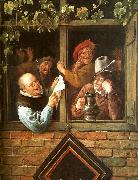
Oil On
Canvas, Real Flavor of Old Masters
|
Jan Steen
|
|||
|
|
|||
| Dutch Baroque Era Painter, ca.1625-1679 Daily life was Jan Steen's main pictorial theme. Many of the genre scenes he portrayed are lively to the point of chaos and lustfulness, even so much that a Jan Steen household, meaning a messy scene, became a Dutch proverb (een huishouden van Jan Steen). Subtle hints in his paintings seem to suggest that Steen meant to warn the viewer rather than invite him to copy this behaviour. Many of Steen's paintings bear references to old Dutch proverbs or literature. He often used members of his family as models. Jan Steen painted also quite a few self-portraits, in which he showed no tendency of vanity. Steen did not shy from other themes: he painted historical, mythological and religious scenes, portraits, still lifes and natural scenes. His portraits of children are famous. He is also well known for his mastery of light and attention to detail, most notably in textiles. Steen was prolific, producing about 800 paintings, of which roughly 350 survive. Steen's work was valued much by contemporaries and as a result he was reasonably well paid for his work. He did not have any students, but his work proved a source of inspiration for many painters. | |||
|
|
|||
|
|
Rhetoricians at a Window Jan Steen5.jpg Painting ID:: 3738 Visit European Gallery |
1662-66 Philadelphia Museum of Art | |
Height Width |
INS/CM |
||
|
X |
|
||
|
|
|||
|
Jan Steen
|
|||
|
|
|||
| Dutch Baroque Era Painter, ca.1625-1679 Daily life was Jan Steen's main pictorial theme. Many of the genre scenes he portrayed are lively to the point of chaos and lustfulness, even so much that a Jan Steen household, meaning a messy scene, became a Dutch proverb (een huishouden van Jan Steen). Subtle hints in his paintings seem to suggest that Steen meant to warn the viewer rather than invite him to copy this behaviour. Many of Steen's paintings bear references to old Dutch proverbs or literature. He often used members of his family as models. Jan Steen painted also quite a few self-portraits, in which he showed no tendency of vanity. Steen did not shy from other themes: he painted historical, mythological and religious scenes, portraits, still lifes and natural scenes. His portraits of children are famous. He is also well known for his mastery of light and attention to detail, most notably in textiles. Steen was prolific, producing about 800 paintings, of which roughly 350 survive. Steen's work was valued much by contemporaries and as a result he was reasonably well paid for his work. He did not have any students, but his work proved a source of inspiration for many painters. | |||
|
|
|||
|
|
Rhetoricians at a Window new25/Jan Steen-799845.jpg Painting ID:: 87583 Visit European Gallery |
Oil on canvas, 74 x 59 cm 1662-1666 cjr | |
Height Width |
INS/CM |
||
|
X |
|
||
|
|
|||
|
Jan Steen
|
|||
|
|
|||
| Dutch Baroque Era Painter, ca.1625-1679 Daily life was Jan Steen's main pictorial theme. Many of the genre scenes he portrayed are lively to the point of chaos and lustfulness, even so much that a Jan Steen household, meaning a messy scene, became a Dutch proverb (een huishouden van Jan Steen). Subtle hints in his paintings seem to suggest that Steen meant to warn the viewer rather than invite him to copy this behaviour. Many of Steen's paintings bear references to old Dutch proverbs or literature. He often used members of his family as models. Jan Steen painted also quite a few self-portraits, in which he showed no tendency of vanity. Steen did not shy from other themes: he painted historical, mythological and religious scenes, portraits, still lifes and natural scenes. His portraits of children are famous. He is also well known for his mastery of light and attention to detail, most notably in textiles. Steen was prolific, producing about 800 paintings, of which roughly 350 survive. Steen's work was valued much by contemporaries and as a result he was reasonably well paid for his work. He did not have any students, but his work proved a source of inspiration for many painters. | |||
|
|
|||
|
|
Rhetoricians at a Window new25/Jan Steen-663895.jpg Painting ID:: 92314 Visit European Gallery |
Oil on canvas, 74 x 59 cm Philadelphia Museum of Art, Philadelphia Date 1662-1666 cyf | |
Height Width |
INS/CM |
||
|
X |
|
||
|
|
|||









